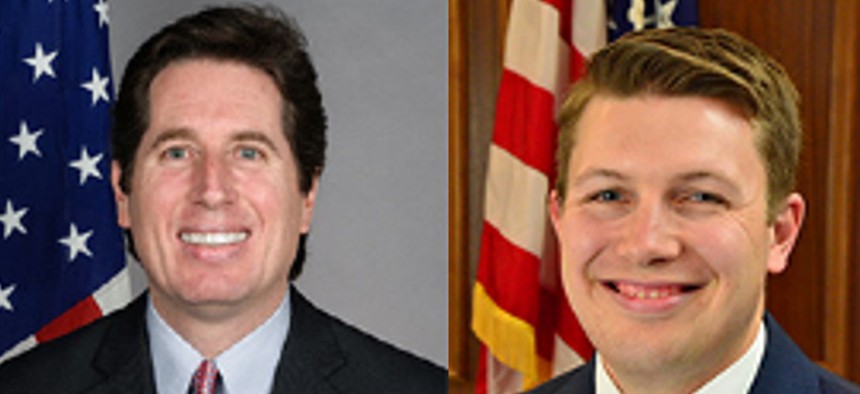
Ray Limon (left) and Tristan Leavitt, two board members confirmed by the Senate earlier this year. Courtesy of MSPB
Biden’s Board Appointees Promise to Finally Provide Feds ‘Extra Insurance’ Against Mistreatment
After five years, a restored Merit Systems Protection Board is setting new precedents with sweeping impacts for the civil service.
When the federal government’s independent board to hear appeals of suspensions, firings and other actions taken against civil servants went dark for five years, nobody won.
It served virtually no one’s ideological interest, achieved no one’s goals and took no work off anyone’s plate. And, of course, neither employees nor agencies were winning their cases. Some observers called the five years without a functioning central panel of the Merit Systems Protection Board “unconscionable,” while others said it was simply bad business.
“You have to have finality,” Tristan Leavitt, one of President Biden’s two board member nominees the Senate confirmed earlier this year, finally restoring a fully functioning board, told Government Executive in a recent interview. “Leaving everyone in limbo, it's bad for the agency, employee and taxpayers.”
MSPB’s central panel lost its quorum—and with it, its ability to render decisions—in early 2017 and has been without a singly presidentially appointed, Senate-confirmed member since early 2019. President Trump nominated multiple slates to fill the vacancies, but they never received a vote on the Senate floor.
Leavitt, who served at MSPB as its de facto executive director prior to his appointment, and Ray Limon, a former career Senior Executive Service employee and Biden’s second pick for the board, are now working together to sort through the unprecedented backlog of 3,500 cases that built up over the last five years. They are slowly making progress, issuing nearly 200 decisions in the roughly three weeks since the Senate confirmed their nominations. Some of those are setting new precedents, creating case law that will affect an untold number of federal employees for years to come.
Both Leavitt and Limon said there are no overt policies or ideas they are looking to instill with those decisions and that it is too early to evaluate the trendlines they may be establishing. They are, however, with the assistance of the career staff that have been fervently working for the last five years to prepare for this moment, selecting cases that could have a broad impact and reflect the diversity of topics that come before the board.
Factors such as who is potentially owed the most back pay or the timing of an appeal is not weighing heavily in the order the board is handling cases. Justice has been delayed, and, as the adage goes, denied, for all of the federal employees in MSPB's queue.
“Every appeal has a name and every name has a face,” Limon said. “So we are making decisions that I believe are apt to resonate across the spectrum of the different types of cases that we hear.”
The career staff has identified a priority group of a few hundred cases for the board to tackle first. While the restoration of a quorum has allowed the central board to finally decide cases that have been further appealed from the administrative judge stage, there still remains a final hurdle. Biden’s pick to chair the board, Cathy Harris, was finally just confirmed by the Senate last week. In the intervening time, any cases on which Leavitt and Limon were split continued to languish. Her confirmation tipped the balance of the board toward Democrats, as Leavitt is a Republican.
Still, even just knowing the board is functional again will likely serve as a lift not just to those who have been waiting for years for resolution to their cases, but to any employees, for example, thinking about blowing the whistle on wrongdoing but afraid of retaliation. Limon said federal employees can now rest easier knowing that MSPB's quorum insulates them against bad management, undue political interference and other prohibited practices.
“Having that expectation now fully in play, I think just provides that extra insurance that employees know that they are protected and they have a venue to come to if they believe they are being mistreated,” Limon said.
Good government and watchdog groups have lamented the long pause without a quorum at MSPB and for years implored the White House and the Senate to take action. Earlier this year, more than 100 such organizations asked the Senate to move on Biden’s nominees, saying the inaction was upending and undermining the civil service. Even the conservative Heritage Foundation has called for a functional MSPB, noting that agencies typically succeed before the board.
Max Stier, president of the Partnership for Public Service, called the lapse "extraordinary," adding that if the federal court system similarly went down it would have resulted in an "unheard of" level of political uproar.
“It is really unconscionable that such a critical aspect of our system was left without capability for that time,” Stier said.
Tea Leaves
While the board members said they are not pushing any specific agenda, the early decisions and precedents offer some clues on the direction in which they will govern.
In multiple precedential cases, the board noted it was taking a "broader view of retaliatory motive” in whistleblower cases. They have allowed appellants to indict managers for improper retaliation solely on presumption they acted out of the concern for the well-being of their agency, even if they were not directly implicated in the relevant disclosures.
Richard Renner, an attorney at Kalijarvi, Chuzi, Newman and Fitch with a long career in civil service law and who has closely followed the decisions from the new board, said the new members are making clear to federal employees that proving disclosures are harmful to their agency is sufficient to prove motive for retaliation.
“That is going to make it easier for whistleblowers to win and harder for agencies to show they would have taken the same action without the whistleblowing,” Renner said.
The board has also shown it wants distinct jurisdictions for various entities involved in civil service law, Renner explained, even if that means narrowing its own purview. The members have ruled they do not have jurisdiction to interfere with internal agency policy relating to returning injured workers to the job, and said employees seeking appealing retaliation after disclosing discrimation must take their cases before the Equal Employment Opportunity Commission.
‘Hard Labor’
As observers try to read the tea leaves for how the new board will rule, the board members themselves are focused simply on cutting down the mountain of cases before them. They are expecting the effort to take years and are currently barely making a dent as new cases come in.
“Hard labor is the only way to get through the cases,” Leavitt said. “I don't think there are really any tricks to it. We just have to put in the time to review the cases, their case files, and some of the issues involved. But we certainly are committed to doing that.”
The board has taken some steps to help move the process along more quickly. Members can vote electronically and most case files have been digitized, rather than moving vote sheets and documents physically between offices. It is too early to predict exactly how long it will take to eliminate the backlog, Limon said, but the members plan to track their results, use metrics and hold themselves accountable.
“Hopefully when they get a third board member confirmed, they’ll be able to work a bit quicker and work down the backlog,” Renner said.
Both board members said their presence has been important not just for the impact it has on the case backlog and the civil service writ large, but also for the impact it has had internally. Limon, who has served as acting chair while Harris remained in limbo, said he has tapped into his vast experience at the Office of Personnel Management and the Interior Department to help steer the workforce back on track. Leavitt, who worked at the Office of Special Counsel helping to lead investigations of alleged whistleblower retaliation before MSPB, said his time on Capitol Hill probing agency malfeasance best prepared him for his role on the board.

MSPB employees have been hard at work the last five years, they said—including the administrative judges who have heard and issued initial rulings on cases—but have not had proper leadership in that time. As a first step, the board has sought to remove some of the potential constitutional controversy surrounding the appointment of its judges.
“I think it's really hard to be part of an agency that doesn't have the board the agency is named after,” Leavitt said. “Just having board members in place really boosts morale. It allows everyone to feel like we're striving to accomplish the mission Congress has given us.”
The board members are now focused on making sure the message they’ve delivered to employees is heard far and wide: MSPB is back. Leavitt said MSPB providing clear guidance, through its precedent, is the best way to help ensure the government is honoring the principles of a merit-based civil service with a workforce that is properly managed.
The goal, he said, is that “everyone understands what the rules are, and they know how to abide by the rules.”
Stier agreed the board's restoration would ensure MSPB has a strategic vision and champions for the organization. The damage of the last several years, however, will be long-lasting, and he does not want the American people to forget it.
“People should be apoplectic about this,” Stier said. “It’s such a loss to our system.”







